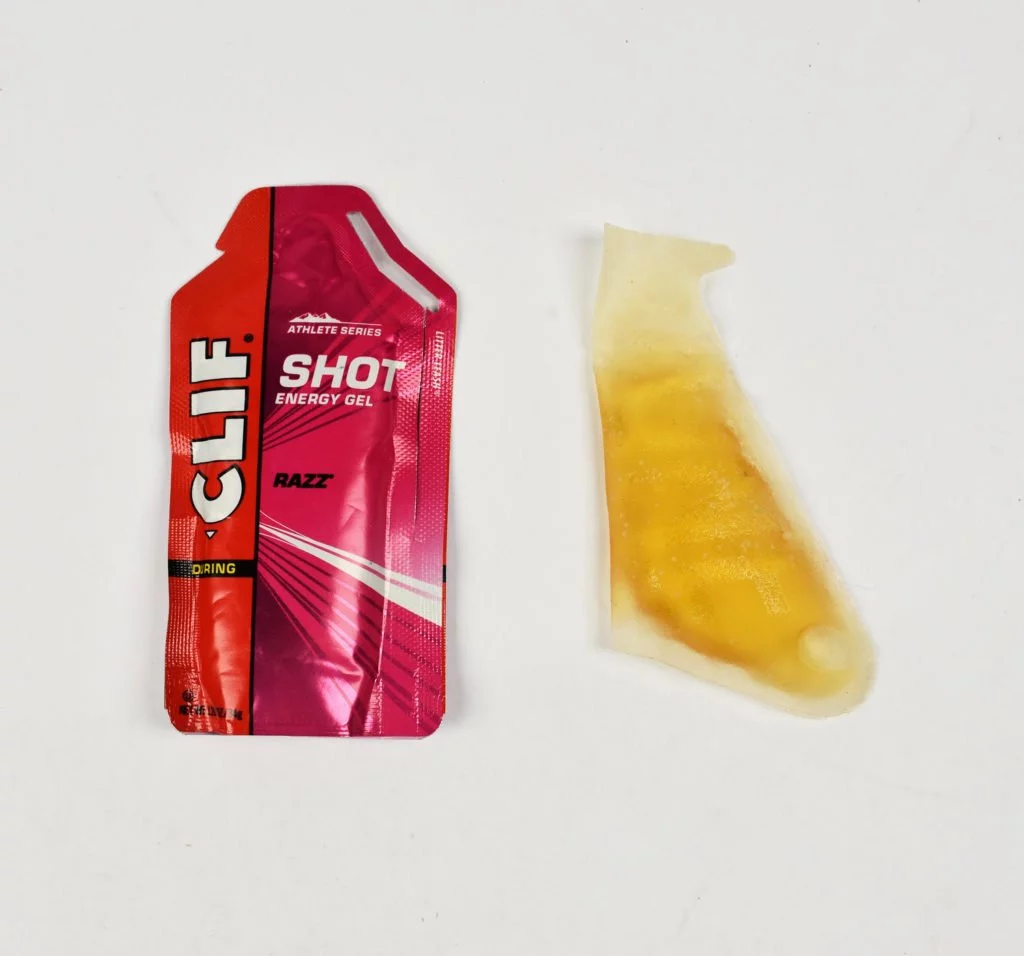This is the era of plasticphobia, but last week I began to worry about my own sanity when I saw this story.
“There’s a new bioplastic packaging for energy gel, a nutritional supplement often used during endurance sports like running or cycling. The bioplastics [sic] is made from a combination of tapioca and potato that is first broken down by acid – in this case, lemon juice and white vinegar – and is then bound back by vegetable glycerin and agar, a type of gelatin derived from seaweed. Rainfall and local critters can break it down in a few days. The material has no impact on pH levels [in] water.”

The waste geek in me was intrigued. A few weeks back I’d been introduced to reusable gel pouches, but was this promising to go one better?
I could find only two other articles about this new wonder-material. “Gone [the brand] provides a hassle-free, eco-friendly solution for on-the-go athletic nutrition,” noted one of the stories. “Existing products use a plastic-coated foil, while Gone allows athletes to dispose of the package immediately with no negative environmental impact; it can be thrown on the side of the road where rainfall and local critters will break it down in a matter of days.”
There was even a handy 36-second video embedded in the story to show how to use the product: cyclist eats gel; cyclist throws packaging on the floor; cyclist smiles. Stunned, I watched the video again.
In the past few months I have been privy to some mind-bogglingly stupid ideas when it comes to plastic-free living but this has no peers. This is a product that has been designed to encourage cyclists (and runners) to litter.
“This is a product that has been designed to encourage cyclists to litter.”
Think about that for a minute.
I’m not sure about you, but the more I think about this product, the more stupid it becomes.
“Rider rubbish”, as one journal put it a couple of years ago, has become a sad by-product of cycling’s popularity, with gels, inner tubes and air canisters discarded by the roadside. On Twitter, one rider posted a picture of the 68 gel wrappers she’d collected in the first kilometre of a descent in the Velothon Wales event in 2016. Hopefully, the litterbugs remain in the minority, but what if this new gel packaging catches on and we are all told it’s ok to chuck it in the hedge for a badger to eat?
https://twitter.com/ClareD_/status/734428422101958656
There is a fair chance you’d still get an on-the-spot fine for littering if you’re caught. But more importantly, the public will only see cyclists flinging packets into verges and we’ll all be tarred as litterbugs. Young riders will also see it as ‘ok’ to follow our lead.
There is also a chance cyclists will take to littering other packaging because they think it’ll disappear without a trace. I’m thinking of stuff marketed as compostable or biodegradable. I have lost count of the times I’ve been asked what to do with compostable coffee cups. It depends on the cup and where you live – some can go in your food waste caddy, some might be ok in your home composter, others will need to be put in the general waste. However, none can be just chucked in a hedge so nature can take its course.
Some companies have made a point of cashing in on this confusion, selling their products as eco-friendly when, it turns out, they are not. I am not suggesting this is what Gone are doing, but that doesn’t mean their idea is a good one.
From the very limited information out there, it’s impossible to tell whether these new energy gel packets really disappear and have no environmental impact whatsoever. But even if they do, littering them all over the countryside is not a message the cycling community should want to be associated with; especially when almost every cycling jersey ever manufactured comes with storage space for your empty wrappers. It’s called a pocket.
Editor’s note: David’s consideration of the potential implications of athletes chucking away this product stem from his experience as a journalist specialising in sustainability, as well as being a keen cyclist. We’re fully aware of the devastation of plastic pollution and it’s not Yellow Jersey’s intention to negate anyone’s efforts to reduce this.